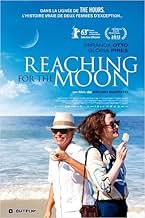PUNTUACIÓN EN IMDb
7,0/10
3,6 mil
TU PUNTUACIÓN
Añade un argumento en tu idiomaA chronicle of the tragic love affair between American poet Elizabeth Bishop and Brazilian architect Lota de Macedo Soares.A chronicle of the tragic love affair between American poet Elizabeth Bishop and Brazilian architect Lota de Macedo Soares.A chronicle of the tragic love affair between American poet Elizabeth Bishop and Brazilian architect Lota de Macedo Soares.
- Premios
- 9 premios y 21 nominaciones en total
Argumento
¿Sabías que...?
- CuriosidadesFour paragraphs appear between the end of the film and the beginning of the credits.
1. "Few women write major poetry. Only four stand with our best men: Emily Dickinson, Marianne Moore, Elizabeth Bishop and Sylvia Plath." - Robert Lowell
2. "I'd rather be called the 'The 16th Poet' with no reference to my sex, than one of 4 women - even if the other three are pretty good." - Elizabeth Bishop
3. Elizabeth Bishop died in 1979 in the United States. She is considered on the most important poets of the English language.
4. In 2012, UNESCO declared the city of Rio De Janeiro a World Heritage site. The Flamengo Park is one of its main attractions.
- PifiasOpening in 1951 but Bobby Vinton singing Blue Velvet was not until 1963.
- Citas
Elizabeth Bishop: It's OK. I'm not drunk. I'm just crying in English.
- Créditos adicionalesNine of the main performers (the first 10) are listed in the credits without the name of their character. Only Treat Williams is credited as his character, Robert Lowell.
- ConexionesReferenced in Programa do Jô: Episodio fechado 26 agosto 2013 (2013)
Reseña destacada
The Brazilian movie Flores Raras was shown in the United States with the title Reaching for the Moon (2013). It was directed by Bruno Barreto.
The film is based on the life of the great American poet, Elizabeth Bishop (Miranda Otto). As the movie begins, Elizabeth is traveling in Brazil, and visits the estate of the famous architect Lota de Macedo Soares, played by Glória Pires. Lota is in a lesbian relationship with Bishop's college friend Mary (Tracy Middendorf).
Despite Elizabeth's somewhat proper and restricted outlook, she accepts the love offered by Lota, even though this leaves Mary as the odd woman out. This act struck me as a shabby betrayal of an old friend, but, in the movie, it's treated as true love that makes such betrayal acceptable, if not inevitable.
It doesn't hurt that Lota has an enormous estate, and enormous resources. As an architect, Lota is able to envision and then design a beautiful writer's studio for Elizabeth.
The strong point of the movie is that it presents the writing of poetry as work. Elizabeth doesn't just close her eyes and wait until the poetic muse strikes her. She sits in the studio and pushes and pulls her poetry into shape. She's also not happy when she's interrupted during the creative process. This is the only film I can remember where creating a poem is shown as a process, and a delicate and difficult process at that.
This idyllic existence is disrupted by Brazilian political events, into which Lota plunges. The remainder of the movie is devoted to how these events play out in the lives of Elizabeth and Lota.
I don't know enough about the details of the coup, or of the lives of the film's principals, to know how accurately the film portrays them. This aspect of the movie is highly melodramatic, but the actual events were probably equally melodramatic. Certainly, the film holds your interest as the situation plays itself out to the end.
We saw this movie on the large screen, where it will work better, especially in the scenes set on Lota's estate. However, it will work well enough on the small screen. It's not a great movie, but it's certainly good enough to repay you for finding and watching it.
The film is based on the life of the great American poet, Elizabeth Bishop (Miranda Otto). As the movie begins, Elizabeth is traveling in Brazil, and visits the estate of the famous architect Lota de Macedo Soares, played by Glória Pires. Lota is in a lesbian relationship with Bishop's college friend Mary (Tracy Middendorf).
Despite Elizabeth's somewhat proper and restricted outlook, she accepts the love offered by Lota, even though this leaves Mary as the odd woman out. This act struck me as a shabby betrayal of an old friend, but, in the movie, it's treated as true love that makes such betrayal acceptable, if not inevitable.
It doesn't hurt that Lota has an enormous estate, and enormous resources. As an architect, Lota is able to envision and then design a beautiful writer's studio for Elizabeth.
The strong point of the movie is that it presents the writing of poetry as work. Elizabeth doesn't just close her eyes and wait until the poetic muse strikes her. She sits in the studio and pushes and pulls her poetry into shape. She's also not happy when she's interrupted during the creative process. This is the only film I can remember where creating a poem is shown as a process, and a delicate and difficult process at that.
This idyllic existence is disrupted by Brazilian political events, into which Lota plunges. The remainder of the movie is devoted to how these events play out in the lives of Elizabeth and Lota.
I don't know enough about the details of the coup, or of the lives of the film's principals, to know how accurately the film portrays them. This aspect of the movie is highly melodramatic, but the actual events were probably equally melodramatic. Certainly, the film holds your interest as the situation plays itself out to the end.
We saw this movie on the large screen, where it will work better, especially in the scenes set on Lota's estate. However, it will work well enough on the small screen. It's not a great movie, but it's certainly good enough to repay you for finding and watching it.
- Red-125
- 11 jun 2014
- Enlace permanente
Selecciones populares
Inicia sesión para calificar y añadir a tu lista para recibir recomendaciones personalizadas
- How long is Reaching for the Moon?Con tecnología de Alexa
Detalles
- Fecha de lanzamiento
- País de origen
- Sitios oficiales
- Idiomas
- Títulos en diferentes países
- Lluna al Brasil
- Localizaciones del rodaje
- Empresas productoras
- Ver más compañías en los créditos en IMDbPro
Taquilla
- Recaudación en Estados Unidos y Canadá
- 45.502 US$
- Fin de semana de estreno en EE. UU. y Canadá
- 14.573 US$
- 10 nov 2013
- Recaudación en todo el mundo
- 1.534.391 US$
- Duración1 hora 58 minutos
- Color
- Relación de aspecto
- 1.85 : 1
Contribuir a esta página
Sugerir un cambio o añadir el contenido que falta

Principal laguna de datos
By what name was Luna en Brasil (2013) officially released in India in English?
Responde













